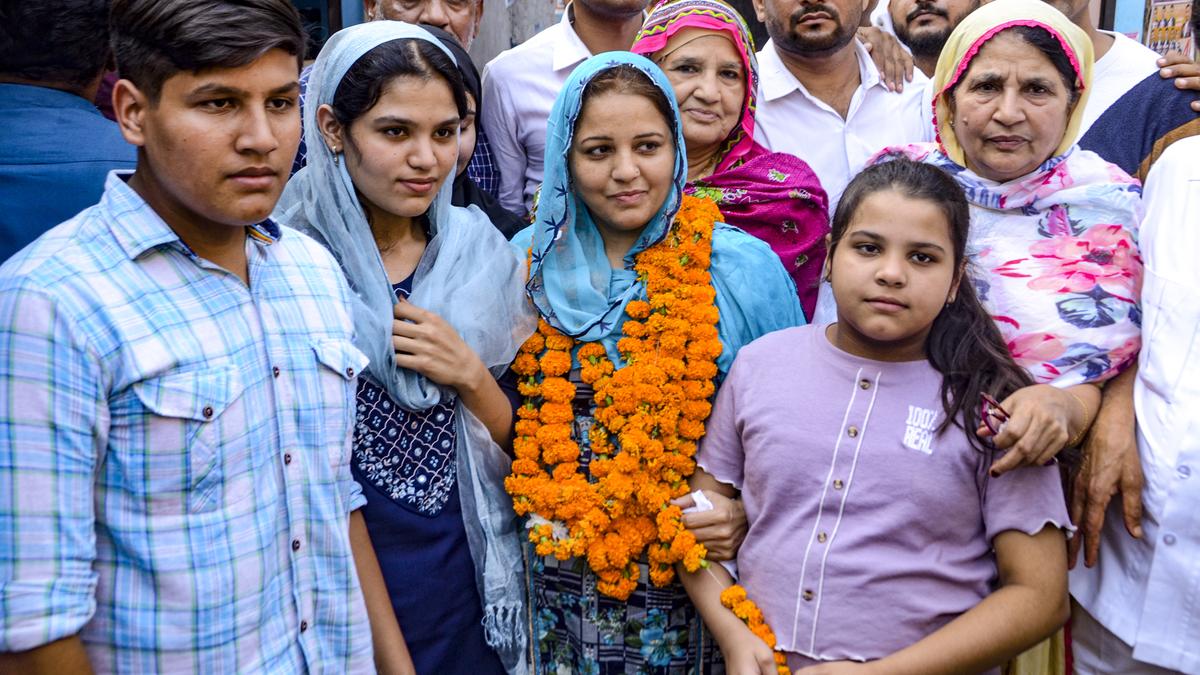
Bypoll candidates milk caste identity in western U.P.
The Hindu
Candidates in Uttar Pradesh byelections strategically appeal to caste identities, highlighting the intricate role of caste in elections.
With a week left for the byelection in nine constituencies in Uttar Pradesh, candidates are busy casting the party ideology into the caste mould. While the Bharatiya Janata Party candidate from Kundarki (Moradabad) accepted a skull cap and keffiyeh from Muslim voters at a public function, visuals of the party candidate from Khair (Aligarh) squatting on stage with folded hands in the Jat-dominated reserved constituency created a flutter on social media. Earlier, Samajwadi Party (SP) candidate from Sisamau (Kanpur) Naseem Solanki earned the ire of some Muslim and Hindu clerics for praying in a temple in the run-up to the polls.
Political observers often shrug off these overtures as political stunts but a deeper look suggests that elections expose the warp and weft of our social fabric.
There is no concept of caste in Islam but during the election season the Muslim society often gets categorised into Gadhas, Sheikhs, Turks, Jhojhas, etc. with their concomitant caste loyalties. The smaller the election, the bigger the role of the caste factor. Locals say caste identity is most visible in panchayat elections followed by bypolls and Assembly elections.
With 63% Muslim voters, BJP’s Thakur Ramveer Singh could find it difficult to win from Kundarki without a chunk of Muslim voters on his side despite being the only non-Muslim candidate in the fray. So, Mr. Singh is reaching out to Muslim Rajputs. SP’s Mohd. Rizwan, a Turk, has his task cut out because the Bahujan Samaj Party (BSP) and Azad Samaj Party (Kanshiram) have also shown faith in Turk candidates.
In Meerapur (Muzaffarnagar), another seat where Muslims have a say in the outcome, it is the SP candidate Sumbul Rana, a Muslim Rajput, who is reaching out to Hindu Rajputs to stay alive in the contest made tough by BSP and ASP (K). Here these parties have picked candidates from the Jhojha community, apparently to take advantage of the caste hierarchy among Muslims. Like Ms. Rana, Ms. Solanki in Sisamau also seems to be expressing her hyphenated identity before the voting.
An SP strategist reminds of the Lok Sabha polls where Iqra Hasan edged past the BJP in Kairana with the help of Hindu Gurjars and Jats and the Thakur vote helped Imran Masood win Saharanpur when the BSP pitted a strong Muslim Gadha candidate against him.
In Khair reserved seat where the Jat vote is decisive, the SP candidate seems to have the best caste combination to get voted. Charu Kain is a Jatav married into an influential Jat family but her opponents allege that it is a marriage of convenience to remain relevant in electoral politics after the seat went under delimitation in 2008. Meanwhile, Surender Diler, a Rashtriya Lok Dal-backed BJP candidate, set the social media abuzz when visuals of him sitting on the stage became viral. While Mr. Diler, a Valmiki, told reporters he was paying respect to elders as per local tradition, the SP and BSP supporters alleged that he was carrying forward the strategy of his grandfather and father, both BJP MPs, who would squat on the floor and carried their own tumbler when they set out to seek votes in Jat households.

Karkala MLA and former Minister V. Sunil Kumar, who came under fire as local Congress leaders in Karkala raised concerns over the authenticity of the 33-ft. Parashuram bronze statue, accused local Congress leaders and the State government of hindering a popular tourism project of Karkala for the past year.










